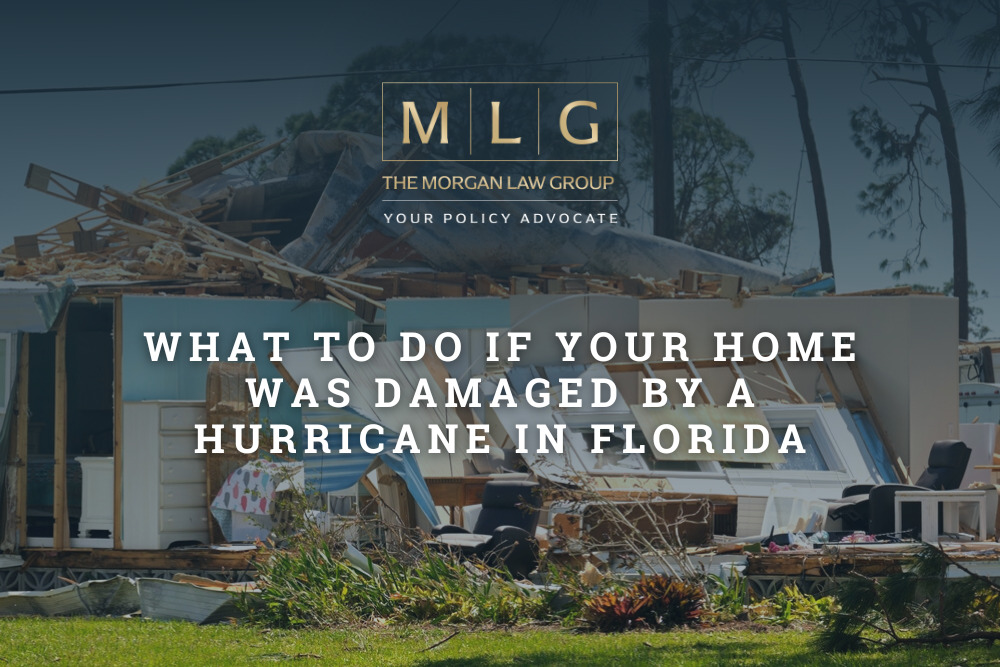Hurricanes are an unfortunate reality for Florida residents. With the Atlantic hurricane season spanning from June 1st to November 30th, these powerful storms have the potential to cause significant property damage, leaving many homeowners feeling overwhelmed and uncertain about their next steps.
At Morgan Law Group, we understand the challenges you face in dealing with hurricane damage in Florida and aim to provide precise and authoritative guidance on navigating the legal process to ensure you receive the compensation you deserve.
Are Florida Homes Covered for Hurricane Damage?
In Florida, homeowners are generally required to have insurance coverage for hurricane damage as part of their standard home insurance policy. However, there can be discrepancies in policy terms and coverage limits, which makes it essential to review your policy carefully.
If you live in a high-risk area, your policy may include a separate hurricane deductible, which could range from 2% to 5% of your home’s insured value. This deductible must be met before your insurance company begins covering the cost of the damage.
Types of Home Damage After a Hurricane
Hurricane damage can manifest in various ways, including:
- Wind damage: High-speed winds can cause significant structural damage to your home, including broken windows, roof damage, and even complete destruction.
- Water damage: Hurricanes often lead to flooding, which can result in extensive water damage to your property, including mold growth and electrical hazards.
- Debris damage: Hurricanes can also cause debris, such as fallen trees or other objects, to damage your property.
- Loss of use: If your home is rendered uninhabitable due to hurricane damage, you may need to seek alternative housing, which could be covered under your insurance policy’s loss of use provision.
Understanding the various types of hurricane damage is critical for effective documentation and filing of your insurance claim. By being aware of potential damage, you can ensure comprehensive coverage and accurately assess the impact of the hurricane on your Florida home.
What To Do If Your Home Was Damaged
When a hurricane strikes and leaves your Florida home damaged, navigating the aftermath can be a daunting task. Know what to do immediately after the disaster, helping secure your property and ensure a robust insurance claim process.
- Prioritize safety: Your first priority should be ensuring the safety of yourself and your loved ones. Follow evacuation orders and avoid returning to your home until it is safe to do so.
- Document the damage: Once it is safe to return, document the damage to your property thoroughly. Take photographs and videos of all affected areas, and make a detailed list of damaged items. This documentation will be crucial when filing your hurricane claim.
- Review your policy: Familiarize yourself with your insurance policy’s terms and conditions, including coverage limits and deductibles. This will help you understand your rights and responsibilities when filing your hurricane claim.
- Contact your insurance company: Notify your insurance company of the damage as soon as possible. Provide them with the necessary documentation, and keep a record of all communication.
- Mitigate further damage: Take reasonable steps to prevent additional damage to your property, such as covering broken windows or making temporary roof repairs. Keep receipts for any expenses incurred, as your insurance may cover these costs.
- Seek legal advice: If you encounter difficulties with your insurance company, or if they undervalue or deny your claim, consider consulting with a knowledgeable hurricane damage lawyer who can help protect your rights and interests.
Following these steps immediately after a hurricane can significantly streamline your recovery process and bolster your insurance claim. Remember, the goal is to ensure your safety, properly document the damage, and secure the rightful compensation to help you rebuild and recover.
Consult a Hurricane Damage Lawyer at MLG
Hurricane damage in Florida can be a devastating experience, leaving homeowners feeling overwhelmed and uncertain about their future. At Morgan Law Group, our experienced hurricane damage lawyers are dedicated to guiding you through the legal process and ensuring that you receive the compensation you deserve.
Our skilled hurricane damage lawyer can provide invaluable assistance in the aftermath of a hurricane, including:
- Policy review: Our attorney can review your insurance policy to ensure you fully understand your coverage and rights, helping you avoid pitfalls and potential disputes with your insurance company.
- Claim preparation: Our hurricane lawyer can help you compile the necessary documentation, expert assessments, and evidence to support your claim, increasing the likelihood of a successful outcome.
- Negotiation: Insurance companies often try to minimize payouts or deny claims altogether. Our experienced hurricane damage lawyer can negotiate on your behalf, ensuring you receive the compensation you deserve for your damages.
- Litigation: If negotiations with the insurance company fail, our hurricane damage lawyer can represent you in court to pursue a fair settlement or judgment.
- Ensuring compliance with deadlines: Navigating the legal process after a hurricane can be complex, and missing important deadlines can jeopardize your claim. Our knowledgeable attorney can ensure you meet all required deadlines and follow the procedures.
- Peace of mind: Dealing with hurricane damage can be emotionally draining, and having an experienced lawyer on your side can alleviate some of the stress and uncertainty you may be experiencing.
If you’re dealing with the aftermath of a hurricane and are unsure of how to navigate your home insurance claim, we’re here to help. Don’t face this challenging time alone; let Morgan Law Group be your trusted partner in your recovery journey. Call us now.

